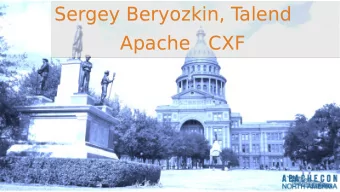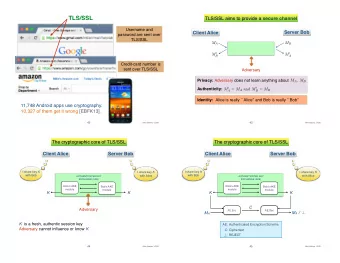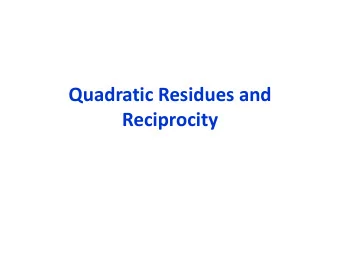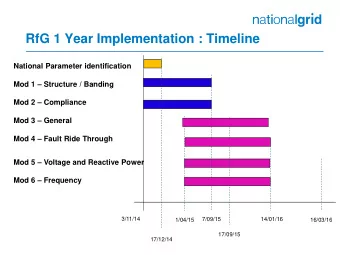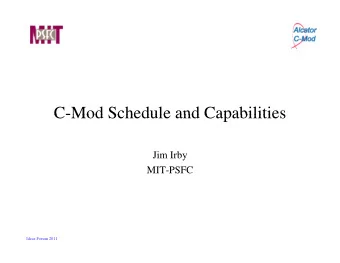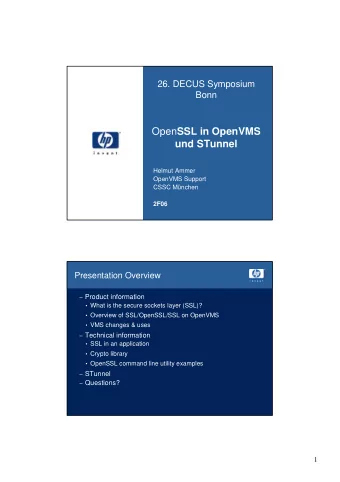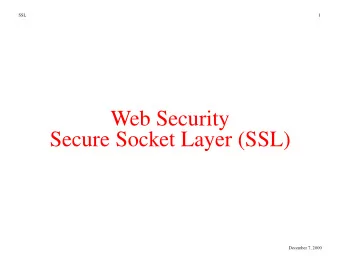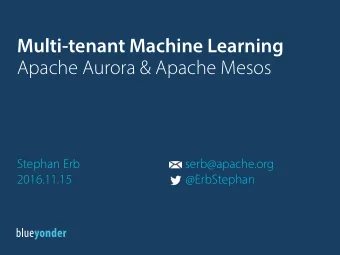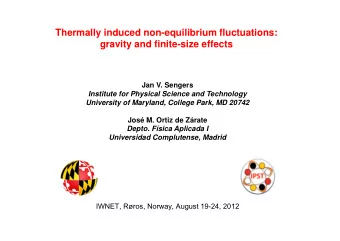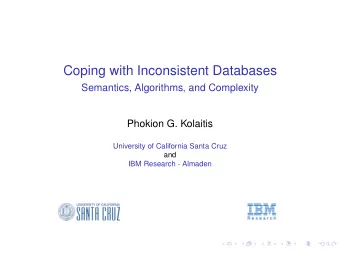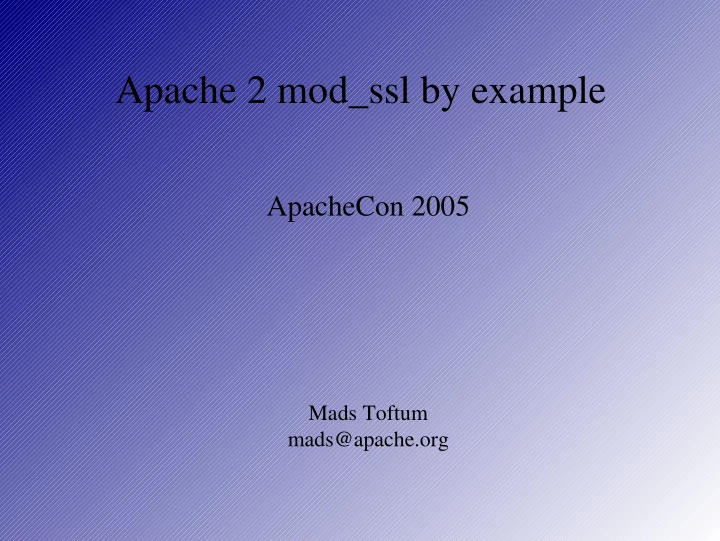
Apache 2 mod_ssl by example ApacheCon 2005 Mads Toftum - PowerPoint PPT Presentation
Apache 2 mod_ssl by example ApacheCon 2005 Mads Toftum mads@apache.org Agenda Getting started Certificates Access control Proxy solutions Performance Building mod_ssl The Apache 1.3 + mod_ssl way Download mod_ssl and
Apache 2 mod_ssl by example ApacheCon 2005 Mads Toftum mads@apache.org
Agenda ● Getting started ● Certificates ● Access control ● Proxy solutions ● Performance
Building mod_ssl ● The Apache 1.3 + mod_ssl way – Download mod_ssl and apache from different sites – Patch apache: $ ./configue –with-apache = ../apache-1.3.x/ \ --with-ssl=../openssl-0.9.x ... #extra apache options $ cd ../apache-1.3.x $ make $ make install
Building apache with mod_ssl ● The Apache httpd 2.x way – Get the source from apache.org $ cd httpd-2.x/ $ ./configure –prefix=/usr/local/apache2 \ --enable-ssl $ make $ make install
Practical example
More build options ● httpd options --enable-ssl[=shared] --with-ssl=DIR ● apr options --with-egd[=DIR] --with-devrandom[=DEV]
Configuring Apache (2.0.x) ● Default config in ssl.conf ● Wrapped in <IfDefine SSL> – Start with -DSSL – apachectl startssl <IfDefine SSL> LoadModule ssl_module modules/mod_ssl.so </IfDefine> <IfModule mod_ssl.c> Include conf/ssl.conf </IfModule>
Configuring Apache (2.1.x) ● Default config in ssl.conf # Secure (SSL/TLS) connections #Include conf/extra/httpd-ssl.conf
Configuring – common part <IfDefine SSL> Listen 1.2.3.4:443 SSLPassPhraseDialog builtin SSLSessionCache shm:logs/ssl_scache(512000) SSLSessionCacheTimeout 300 SSLMutex file:logs/ssl_mutex SSLRandomSeed startup builtin SSLRandomSeed connect builtin
Configuring - VirtualHost <VirtualHost 1.2.3.4:443> SSLEngine on ServerName example.com:443 DocumentRoot "/serverroot/htdocs/" SSLCertificateFile conf/ssl.crt/server.crt SSLCertificateKeyFile conf/ssl.key/server.key </VirtualHost> </IfDefine>
Note about Common Name http://wiki.cacert.org/wiki/VhostTaskForce
Generating certificates with openssl ● Preparations openssl.cnf (/usr/local/ssl/openssl.cnf) $ echo '01' > serial $ touch index.txt $ mkdir certs crl newcerts private
openssl – generating CA ● Generate private key – openssl genrsa -des3 2048 ● Generate CA certificate – openssl req -new -x509 -days 3650 ● Check the certificate – openssl x509 -in cacert.pem -noout -text
openssl – server cert ● Generating server keypair – openssl genrsa -des3 -out server.key 1024 ● Generating the request – openssl req -new -key server.key -out server.csr ● Signing the server certificate with your CA – openssl ca -out server.crt -infiles server.csr ● Verify the generated certificate – openssl verify -CAfile cacert.pem server.crt
Generating certificates - tinyca http://tinyca.sm-zone.net/
Removing the passphrase ● startup $ umask 077 $ openssl rsa -in server.key -out unsafe.key ● SSLPassPhraseDialog – exec:/path/to/program – /path/to/program servername:port RSA
Using Client Certs - 1 ● SSLVerifyClient – none (default) – require – optional / optional_no_ca Ex: SSLCACertificateFile conf/ca.crt SSLVerifyClient require SSLVerifyDepth 1
Client cert – error messages ● Failed client cert validation errors are difficult to decipher in the browser SSLVerifyClient optional RewriteEngine on RewriteCond %{SSL_CLIENT_VERIFY} !=”SUCCESS” RewriteRule .* /path/client-cert-error.html [L] Note: many other env vars
Client Cert – tracking users Environment variables can be used to match client certs to requests: Combined Log Format: LogFormat "%h %l %u %t \"%r\" %>s %b \"%{Referer}i\" \"% {User-Agent}i\"" combined With SSL_CLIENT_S_DN LogFormat "%h %l %u %t \"%r\" %>s %b \"%{Referer}i\" \"% {User-Agent}i\" \"%{SSL_CLIENT_S_DN}x\" " ssl
Client certs – per directory ● Directives can be applied in a directory context SSLCACertificateFile conf/ca.crt SSLVerifyClient none <Location /admin> SSLVerifyClient require SSLVerifyDepth 1 </Location>
Client certs – mapping to users ● SSLOptions +FakeBasicAuth – SSL_CLIENT_S_DN – openssl x509 -noout -subject -in certificate.crt – C=DK/L=CPH/CN=Mads:xxj31ZMTZzkVA <Directory /> SSLOptions +FakeBasicAuth AuthType Basic AuthName Cert AuthUserFile conf/htpasswd require valid-user </Directory> Replaced by SSLUserName from 2.0.51
Client certs – group based access ● SSLRequire ComplicatedExpression SSLRequire ( \ %{SSL_CLIENT_S_DN_O} eq "Snake Oil, Ltd." \ and \ %{SSL_CLIENT_S_DN_OU} in ("Staff “, “Boss") \ )
Proxy – wrapping legacy services ● Add SSL support to http services ● Offload SSL processing <VirtualHost 1.2.3.4:443> SSLEngine on ProxyPass / http://10.0.0.2/ ProxyPassReverse / http://10.0.0.2/ </VirtualHost>
Proxy - “unwrapping” SSL ● Opposite of previous slide <VirtualHost 1.2.3.4:80> SSLProxyEngine on ProxyPass / https://www.example.com/ ProxyPassReverse / https://www.example.com/ ... SSLProxyCACertificateFile conf/certs/ca.crt SSLProxyVerify require </VirtualHost>
speed - keysize ● Size does matter! sign verify sign/s verify/s rsa 512 bits 0.0019s 0.0002s 528.8 5903.0 rsa 1024 bits 0.0090s 0.0005s 110.6 2100.7 rsa 2048 bits 0.0532s 0.0016s 18.8 644.0 rsa 4096 bits 0.3534s 0.0054s 2.8 185.8
speed - keysize
Speed – session cache ● SSLSessionCache – none – dbm:file – shm:file(size) ● SSLSessionCacheTimeout – Clients may time out sessions – %{SSL_SESSION_ID} ● distributed - www.distcache.org
Speed – misc ● /manual/mod/mod_ssl.html#envvars ● /manual/ssl/ssl_compat.html#variables ● SSLOptions – StdEnvVars / CompatEnvVars / ExportCertData – significantly grows the size of the environment – <Files ~ "\.(pl|cgi)$"> ● OptRenegotiate – tries to renegotiate when SSL settings change in directory context to avoid overhead of full handshake
Questions ? http://people.apache.org/~mads/ac2005/
Intra/extranet
Recommend
More recommend
Explore More Topics
Stay informed with curated content and fresh updates.



